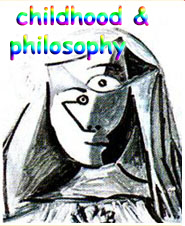perspectivas do ensinante e do aprendiz sobre a discussão filosófica – incerteza como desafio e oportunidade
DOI:
https://doi.org/10.12957/childphilo.2019.42675Palavras-chave:
incerteza, teoria da educação, filosofarResumo
Investigamos as experiências de professorxs e crianças com a filosofia com crianças através da análise do conteúdo de entrevistas com professorxs da educação infantil e de discussões com grupos de alunos deste mesmo segmento. Os resultados mostram que sessões periódicas de filosofia com crianças podem impactar a visão dxs professorxs de si próprixs como educadores, sua abordagem de ensino e seu desenvolvimento pessoal. Do ponto de vista das crianças, o aspecto mais importante e significativo, além do conteúdo da discussão filosófica, era a oportunidade de pensarem juntas de forma não-definitiva. Um componente essencial da construção de sentido coletiva foi a incerteza, que é um aspecto integral da discussão filosófica. Essas descobertas se relacionam com a ideia de um “cidadão agente” de diversas maneiras. Filosofar com as crianças leva a um estilo de ensino mais colaborativo e democrático, que dá a elas espaço para trazerem para a discussão seus próprios interesses e atividades. Isto se alinha com a satisfação dos alunos em relação à abertura da incerteza das questões filosóficas, a valorização da oportunidade de se envolver com diferentes ideias e pontos de vista e seu desejo de enfrentar o desafio de rever suas próprias posições e mudar seu pensamento.Downloads
Referências
Barrow, W. (2015). „I think she’s learnt how to sort of let the class peak“. An exploratory study of children’s perspectives on P4C as participatory pedagogy. In Thinking skills and creativity, 17, p. 76-87.
Fair, F., et al. (2015). Socrates in the Schools from Scotland to Texas. Replication a study on the effects of a Philosophy for Children program. In Journal of Philosophy in Schools, 2/1, p. 18-37.
Flick, Uwe (2016). Qualitative Sozialforschung. Eine Einführung. 7th Edition. Reinbek bei Hamburg.
Gaparatou, R. & Erganzaki, M. (2015). Stundents’ Views about Their Participation in a Philosophy Program. In Creative Education, 6, p. 726-737.
Gorard, S., Siddiqui, N., & See, B. H. (2015). Philosophy for Children. Evaluation Report and Executive Summary. School of Education. Durham University.
Haller, T. (2015). Philosophieren mit Kindern im Fachunterricht. Eine empirische Untersuchung zu Erfahrungen und Einstellungen von Lehrerinnen und Lehrern. Masterarbeit im Studiengang Lehramt Primar- und Sekundarstufe. Universität Hamburg.
Helsper, W. (1996). Antinomien des Lehrerhandelns in modernisierten pädagogischen Kulturen. Paradoxe Verwendungsweisen von Autonomie und Selbstverantwortlichkeit. In A. Combe, W. Helsper (Ed.). Pädagogische Professionalität. Untersuchungen zum Typus pädagogischen Handelns, p. 521-569.
Helsper, W. (2001). Antinomien des Lehrerhandelns – Anfragen an die Bildungsgangdidaktik. In U. Hericks/J. Keuffer/H.-Ch. Kräft/I. Kunze (Ed.). Bildungsgangdidaktik. Perspektiven für Fachunterricht und Lehrerbildung. Opladen.
Helzel, G. (2018). Kindliche Entwicklungsprozesse beim Philosophieren. Eine empirische Studie zu Ungewissheit und Mehrperspektivität. Opladen, Berlin, Toronto.
Helzel, G./Michalik, K. (2015). Kindliche Entwicklungsprozesse beim Philosophieren mit Kindern. Eine empirische Untersuchung zu Mehr-Perspektivität und Ungewissheitstoleranz. In: H.-J. Fischer/H. Giest/K. Michalik (Ed.): Bildung im und durch Sachunterricht. Bad Heilbrunn, p. 189-196.
Jenkins, J. (1986). Philosophy for Children Programme at a Gloucestershire Cemprehensive School in Great Britain. In Thinking. The Journal of Philosphy for Children, 6, 3, p.33-37.
Jeschke, S. (Ed.) (2013). Exploring Uncertainty. Ungewissheit und Unsicherheit im interdisziplinären Diskurs. Wiesbaden.
Koller, H.C. (2012): Bildung anders denken. Einführung in die Theorie transformatorischer Bildungsprozesse. Stuttgart.
Mayring, P. (2015). Qualitative Inhaltsanalyse. Grundlagen und Techniken. 12., revised edition. Weinheim und Basel. Beltz.
Michalik, K. (2012). Interviews mit Lehrkräften und Gruppendiskussionen mit Kindern zu Wahrnehmungen und Bewertungen des Philosophierens mit Kindern. Forschungsprojekt an der Fakultät für Erziehungswissenschaft der Universität Hamburg.
Michalik, Kerstin (2015): Philosophische Gespräche mit Kindern als Medium für Bildungsprozesse im Sachunterricht. In Bildung im und durch Sachunterricht. In H.-J. Fischer/H. Giest/K. Michalik. Bad Heilbrunn. p. 175 – 182.
Michalik, K. (2018). Empirische Forschung zu Wirkungen philosophischer Gespräche mit Kindern. In. H. de Boer, K. Michalik (Ed.). Philosophieren mit Kindern - Forschungszugänge und -perspektiven. Opladen, Berlin, Toronto, p. 13-32.
Pálsson, H. (1996). We Think More than Before about Others and their Opinions. An Evaluation Report from Iceland. In. Thinking and Reasoning 12, p. 24-28.
Pfeiffer, S. (2013). Das Unterrichtsfach Philosophieren mit Kinder in MecklenburgVorpommern. In Pädagogische Rundschau 67, 6, p. 651-669.
Scholl, R. (2014). „Inside-out Pedagogy“. Theorising Pedagogical Transformation through Teaching Philosophy. In Australian Journal of Teaching Philosophy, 39/6), p. 89-106.
Siddiqui, N., Gorard, S., See, B. H. (2017). Non-cognitive impacts of Philosophy for Children. School of Education Durham University.
Scholl, R./Nichols, Kim/Burgh, Gilbert (2014). Transforming pedagogy through philosophical inquiry. In. International Journal of Pedagogies and Learning, 9/3, p. 253-272.
Scholl, Rosie/Nichols, K./Burgh, G. (2016). Connecting learning to the world beyond the classroom through collaborative philosophical inquiry. In. Asia-Pacific Journal of Teacher Education, 44/5, p. 436-454.
Topping, Keith J./Trickey, Steve (2007). Collaborative Philosophical Enquiry for School children. Participant Evaluation at 11 Years, in. Thinking. The Journal of Philosophy for Children 18/3, p. 23-34.




